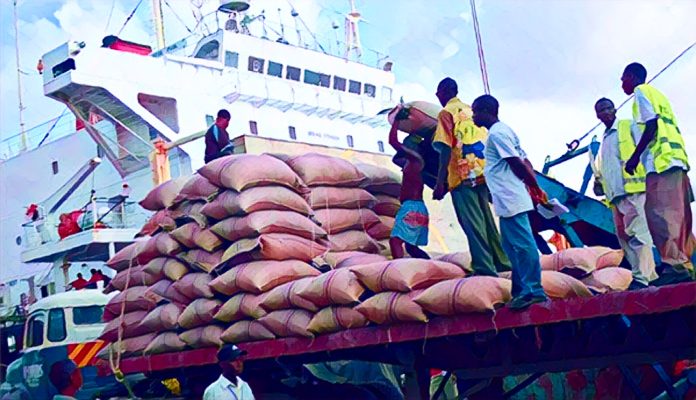Nigeria’s food import bill rose sharply in the first half of 2025 as weak local production and insecurity continued to undermine the country’s agricultural output.
Data from the National Bureau of Statistics showed that food and beverage imports climbed to N677.3 billion, up 44.5 percent from N468.7 billion recorded in the same period of 2024.
The figures have renewed calls for stronger government support to boost local industry and reduce dependency on foreign supplies.
Rising Imports, Weak Production
While the import value of primary food and beverages for household use surged, processed food imports dropped slightly by 1.85 percent — from N699.6 billion in 2024 to N686.8 billion this year.
Imports of food for industrial use also increased. Primary imports for factories grew 1.37 percent to N982.5 billion, while processed imports rose 7.28 percent to N1.06 trillion.
Members of the Organised Private Sector linked the surge to insecurity, weak agricultural policies, and the growing preference for imported products.
Local Producers Face Trust Deficit
Tunde Banjoko, who chairs the Lagos Chamber of Commerce and Industry’s Agricultural and Allied Group, said the figures show that Nigerians have more confidence in imported goods.
“People trust the quality and integrity of imported raw materials and food items more than local ones,” he said.
Banjoko added that poor funding, weak seed quality, and inefficient production systems keep local output low. “Our storage systems are inadequate, and weak commodity boards have worsened the problem,” he said.
He urged the government to strengthen funding for agribusiness, improve storage, and set up guaranteed offtake systems through commodity boards to stabilize the market.
“With proper financing, technology, and policies, local producers can compete better and cut down imports,” he said.
Insecurity Keeps Farmers Away
Dr. Femi Egbesola, president of the Association of Small Business Owners of Nigeria, blamed insecurity and poor technology use for low output.
“Many farmers have left their farms because of insecurity. Fields are deserted, and that affects the supply chain,” he said.
Egbesola noted that Nigeria’s agricultural productivity remains far below global standards. “To produce 10 tons of cassava here takes 30 acres. In the Netherlands, it takes only three plots,” he said.
He called for more mechanization and technology integration in farming to close the gap. “This gap is also an opportunity for investors in local production,” he said.
Policy and Price Pressures
Dr. Muda Yusuf, director of the Centre for the Promotion of Private Enterprise, said the government’s import waivers and the naira’s depreciation contributed to the higher figures.
“The biggest driver of food imports is wheat. Bread, pastries, and noodles are staple foods,” he said.
He noted that the 180-day import waiver for maize and brown rice in 2024 influenced this year’s data. “Even if physical quantities are not much higher, the weaker naira makes the import value look larger,” he said.
Yusuf advised the government to focus on value chain development, promote local substitutes for wheat, and reduce policy inconsistency.
Falling Purchasing Power
Eke Ubiji, director general of the Nigerian Association of Small and Medium Enterprises, warned that rising imports do not reflect stronger consumer spending.
“Many people have reduced what they buy because of inflation,” he said. “This rise likely comes from industrial demand, not households.”
He added that consumers are turning to smaller, cheaper products. “People who never ate noodles before are now eating them because that’s what they can afford,” he said.
Ubiji argued that government claims of improved living conditions do not match reality, as food prices remain beyond the reach of many Nigerians.
Balancing Imports and Food Security
Analysts say reversing Nigeria’s growing reliance on food imports will require a coordinated strategy across agriculture, manufacturing, and trade.
They urged the Federal Government to tackle insecurity, strengthen value addition, and improve access to finance for farmers and processors.
Banjoko summed up the consensus: “If we can make local production sustainable through better funding, technology, and storage, Nigeria can cut import dependence and ease pressure on foreign exchange.”
Inflation and Policy Shifts
Food inflation has remained one of Nigeria’s biggest challenges. Access to food worsened in the past five years due to insecurity and past import restrictions under former President Muhammadu Buhari.
The Tinubu administration later declared a national emergency on food security and lifted restrictions for 150 days on key items like rice. While that policy temporarily reduced prices, farmers criticized it for undermining self-sufficiency.
The government credited the waiver with slowing food inflation, which fell to 16.87 percent in September 2025, down from 37.77 percent a year earlier.
Still, stakeholders warn that long-term food supply risks remain, with rising imports now topping N2.22 trillion in the first half of the year.
Farmers and millers insist that without stronger domestic support, Nigeria could slip deeper into dependence on imported food.



